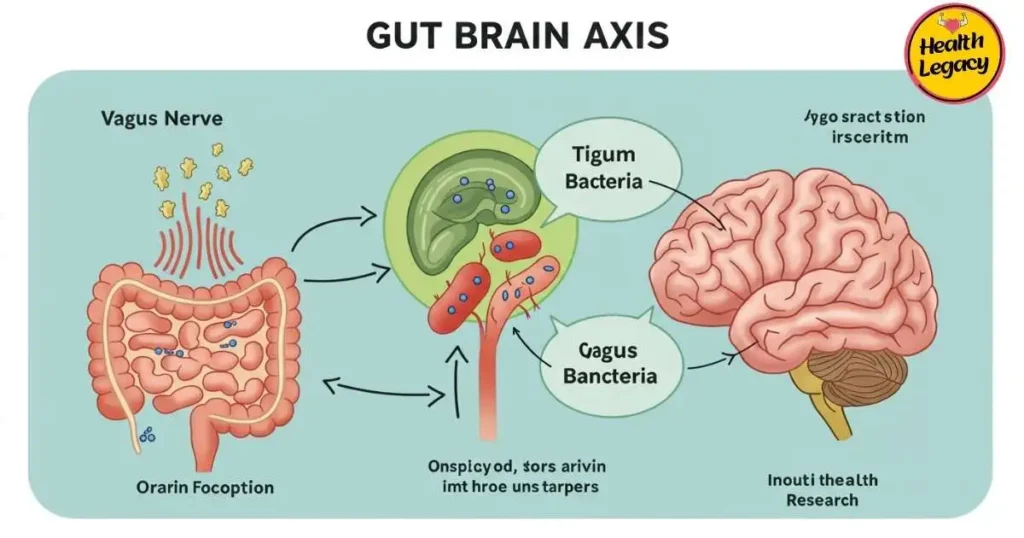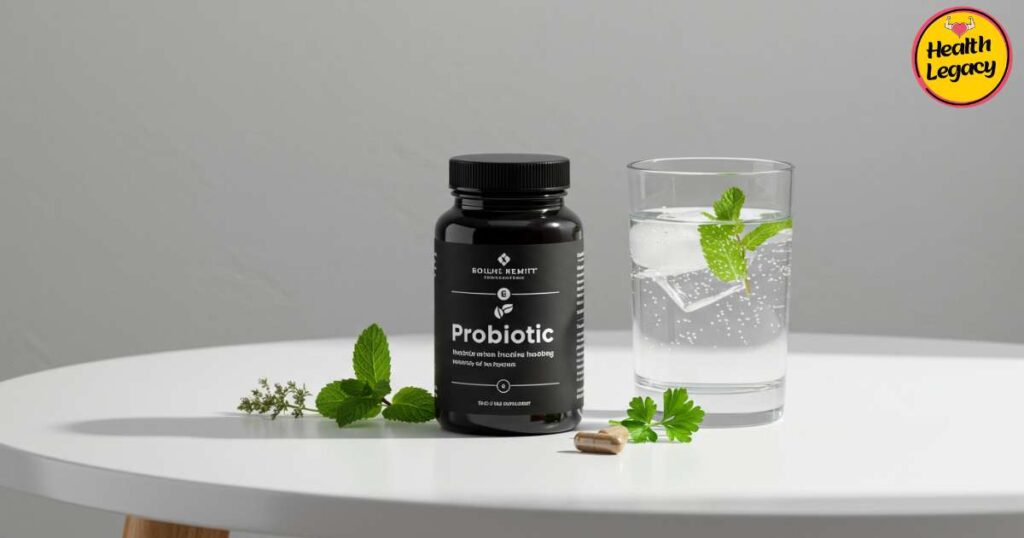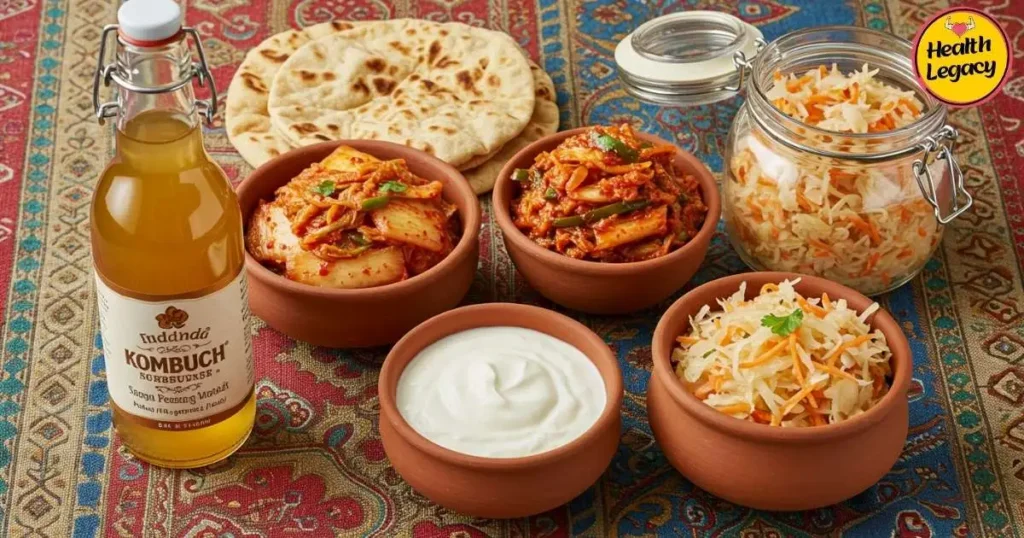Can Probiotics for Mood Rewire Your Gut-Brain Axis?
What if your gut held the key to a happier mind? Ever felt butterflies in your stomach before a big moment? Or wondered why a bad meal leaves you cranky? That’s your gut-brain axis talking—a two-way street between your gut and brain that shapes how you feel.
At Health Legacy, we’re digging into how gut health and anxiety, mental health nutrition, and probiotics for mood tie into microbiome mental wellness. This isn’t just science geek stuff—it’s real, practical know-how to help you feel better. Whether you’re battling stress in a busy Mumbai market or unwinding on a Rockies hike, your gut’s got a say in your mood. Let’s chat about how the gut-brain axis works and how you can tweak it to lift your spirits.

Understanding the Gut-Brain Axis
What Is the Gut-Brain Axis?
Picture your gut and brain as buddies texting all day. They chat through the vagus nerve—a kind of hotline linking your belly to your head. This setup is the gut-brain axis, and it’s a big deal. Your gut’s packed with trillions of bacteria—your microbiome—and they’re not just sitting there. They churn out mood-lifting stuff like serotonin, the “feel-good” chemical.
When your gut’s happy, your brain gets the good vibes. But if your gut’s off—like after too many samosas or late-night burgers—it can mess with your head, sparking gut health and anxiety or even low moods.

The Science Behind the Gut-Brain Connection
Here’s the cool part—your gut bacteria make brain chemicals. About 90% of serotonin comes from your gut, not your head! When your microbiome is balanced, you’re more likely to feel calm and sharp. But if it’s out of whack—say, from junk food or stress—it’s called dysbiosis. That can kick up inflammation, which messes with your brain and mood. Studies show folks with depression often have funky gut bacteria. So, fixing your gut with mental health nutrition could be a game-changer for gut health and cognitive function.

How Gut Health Affects Mental Health
The Impact of Gut Health on Mood and Emotions
Your gut’s like a mood DJ. When your microbiome diversity is on point, your emotions stay steady. But if it’s off, you might feel down or snappy without knowing why. Your gut bacteria pump out serotonin and dopamine—happy chemicals your brain loves. Trouble is, a junky diet or stress can spark inflammation in your gut, which travels to your brain and drags your mood down. Ever notice how a heavy meal in Delhi’s heat can leave you grumpy? That’s your gut-brain axis saying, “Help me out here!”

Gut Health and Anxiety
That knot in your stomach before a big talk? It’s your gut-brain axis at play. An imbalanced microbiome can send panic signals to your brain, ramping up gut health and anxiety. But you can chill things out. Eating probiotics for mood—think yogurt or kefir—helps balance those bacteria. Toss in some yoga or a walk by the Ganges, and you’re golden. Studies back this up—people with better gut health often feel less stressed.
Gut Health and Depression
Depression’s tough, but your gut might be part of the puzzle. Research shows folks with low moods often miss key gut bacteria like Lactobacillus—ones that make serotonin. Less serotonin, lower mood. The fix? Feed your gut with fiber-rich foods—veggies, fruits, whole grains—and maybe a gut health supplement. Studies from the U.S. say probiotics for mental health can lift depressive symptoms. It’s not a cure, but it’s a solid step.

Gut Brain Axis and Sleep
Struggling to snooze? Your gut might be the culprit. Healthy gut bacteria help make melatonin—the sleep hormone. When your microbiome is off, sleep suffers, and that can tank your mood. Try prebiotics for mental health—like bananas—or sip chamomile tea before bed. A good night’s rest keeps your gut-brain axis and stress in check, so you wake up ready to tackle the day.
Nutrition and the Gut-Brain Axis
Mental Health Nutrition: Foods That Boost Gut and Brain Health
What you eat shapes your gut—and your mind. A diet loaded with probiotics, prebiotics, and fiber keeps your gut-brain axis humming. Think yogurt, sauerkraut, and oats—simple stuff that packs a punch. These foods fuel your gut bacteria, boosting gut health and emotional resilience. Whether you’re grabbing a quick bite in New York or a thali in Bangalore, picking gut-friendly foods can lift your spirits.

Probiotics for Mood and Mental Wellness
Probiotics are gut superheroes. They crank up serotonin and cut inflammation, easing gut bacteria and depression. Strains like Bifidobacterium longum—found in supplements like this one on Amazon—show promise for mood. Add probiotic-rich foods like kefir to your breakfast, and you’re set. Devanshi Priya, our star writer at Health Legacy, swears by this trick for staying sharp.

Mental Health Benefits of Fermented Foods
Love a tangy bite? Fermented foods like kimchi and kombucha are gold for your gut. They’re bursting with probiotics that balance your microbiome and anxiety. Toss some sauerkraut on your sandwich or sip kombucha on a hot day—it’s easy and tasty. Just watch the sugar—too much feeds the bad bugs. These goodies support gut health and neurotransmitter production, keeping you steady.

Fiber-Rich Foods for Gut Health
Fiber’s your gut bacteria’s favorite snack. It helps them thrive, which boosts microbiome mental wellness. Load up on fruits, beans, and whole grains—think a bowl of dal or a Colorado apple. A fiber-packed diet keeps your digestion smooth and your brain clear. It’s a simple tweak with big payoffs for gut health and mood.
Practical Tips for Improving Gut Health
Gut Health Tips for Better Mental Wellness
Boosting your gut’s easy with a few habits:
- Munch on colorful veggies and fruits daily.
- Sip water—tons of it—to keep things moving.
- Try probiotics for sleep—yogurt before bed works wonders.
- Move your body—a quick jog or dance sesh helps your gut.
- Ditch processed junk—it throws your microbiome off.
These steps cut gut-brain axis and stress, lifting your mood fast.
Incorporating Probiotics for Stress and Cognitive Function
Stress can trash your gut, but probiotics fight back. They calm your microbiome, easing gut health and cognitive function. Snack on pickles or stir kefir into your smoothie. Pair it with deep breaths or a stroll, and you’ll feel sharper. Research says probiotics for stress can even help you think clearer under pressure.
Lifestyle Changes to Support the Gut-Brain Connection
Your daily routine matters. Sleep 7-9 hours—your gut bacteria need it. Hydrate like you’re crossing the Thar Desert. Skip the fries—processed stuff stirs up trouble. Chill out with meditation or a podcast. These tweaks keep your gut-brain axis strong, helping you roll with life’s punches.

Success Stories and Real-Life Examples
Real People, Real Results: Gut Health Transformations
Meet Angila (not real, but her story feels true). She’s a i teacher who fought gut health and anxiety for years. Therapy helped, but her gut was the missing link. She swapped oily chaat for fermented foods and added a probiotic supplement. Soon, her jitters faded, and she slept like a baby.
Then there’s Mike, a fictional Colorado hiker. Depression had him stuck, but he tried mental health nutrition—more fiber, less junk. Months later, he felt lighter, tackling trails with a grin. These tales show how gut health transformations can change lives.

Conclusion
Your gut-brain axis ties gut health and anxiety, probiotics for mood, and microbiome mental wellness into one powerful package. Feed your gut with mental health nutrition, and you’ll tame stress, lift moods, and sleep better. At Health Legacy, we’re all about sharing these nuggets—thanks to pros like Devanshi Priya. Start small—grab some yogurt, skip the soda, take a walk. Your gut’s chatting with your brain right now, so give it some love. You’ll feel the difference, and your mind will too.
FAQs
1. What’s the gut-brain axis?
It’s the chat line between your gut and brain. Your gut bacteria send signals via nerves and chemicals, shaping gut health and mood.
2. How do probiotics help mental health?
Probiotics balance your microbiome, boosting serotonin and cutting inflammation. That can ease gut bacteria and depression or stress.
3. Can diet fix anxiety?
Yep! Prebiotics for mental health and probiotics calm your gut, which chills your mind. Ditch junk, add fiber—it works.
4. What foods boost gut health?
Try yogurt, kimchi, oats, and bananas. They’re packed with probiotics and fiber-rich foods for a happy gut.
5. How’s sleep tied to the gut-brain axis?
Good sleep helps your gut bacteria thrive, making melatonin. A solid snooze supports gut health and emotional resilience.
Also Read :
- Health Benefits of Having a Routine | Northwestern Medicine
- 10 habits for good health – Harvard Health
- Dimensions of wellness: Change your habits, change your life – PMC
- Changing Your Habits for Better Health – NIDDK
- Setting SMART goals for success – Mayo Clinic Health System
- Be SMART about setting health-related goals | Aging | Diet and Nutrition | Prevention | UT Southwestern Medical Center
- How to Create a Balanced Wellness Routine That Works for You – The Coach Space
- 5 Important Components of Health-Related Fitness
- Ozempic: How This GLP-1 Drug Is Transforming Weight Loss Journeys Worldwide
- Best Exercise For Weight Loss and Get Fit




